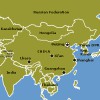I spent couple weeks in China, funded through the joint Royal Society of Chemistry / (Chinese) State Administration for Foreign Experts Affairs [RSC-SAFEA] programme. My trip (covering North, South and East China) consisted of visits to Beijing (International Symposium on Environment and Health (ISEH) at Peking University), Xiamen (where I visited Xiamen University) and Hangzhou (Zhejiang Academy of Agricultural Sciences, ZAAS). During the visit, I gave research seminars at the two visiting institutions (Xiamen University and ZAAS) and presented one poster in the conference (ISEH). Also I had research talks with existing and potential collaborators. We discussed about some joint PhD student programmes, proposals for joint research projects (e.g. joint research funding from Royal Society and National Natural Science Foundation of China (NNSFC) etc.) and joint papers published. Actually, in August 2014, I was told that my Overseas Scholars Joint Grant with Xiamen University was successfully awarded by NNSFC. I also took the opportunity for some holidays with my family and friends in China.
3-5 July (Beijing)
I arrived in Beijing on the morning of Thursday 3rd July, following a long trip from Aberdeen, via Munich and Frankfurt. I had a much needed rest and then was welcomed by the conference committee of ISEH 2014 in the evening. The conference started from the next day (Friday) for two days, which is a good platform and opportunity to meet and communicate with different colleagues on the relevant topics (Environment and Health). I got chance to talk on the potential research collaboration particularly with Dr Lei Wang (from British Geological Survey) and Dr Chaosheng Zhang (National University of Ireland, Galway).
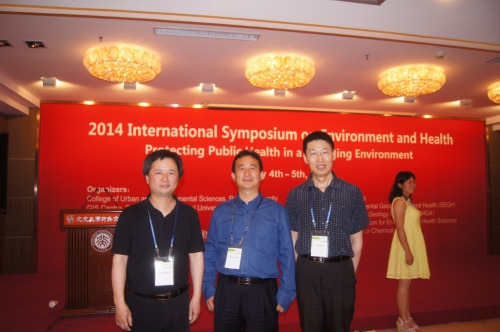
(Left to right: Zulin Zhang, Chaosheng Zhang, Lei Wang at Beijing, ISEH 2014)
At the conference I presented my poster entitled with ‘Environmental Transport and Seasonal Changes of Pesticides in Catchment Scale’ in the conference. In this study, we employed novel passive sampler (Polar Organic Chemical Integrated Sampler, POCIS) for assessing pesticides contamination in the catchment river, there were quite a few researchers interested in the passive sampling techniques for water pollutants monitoring from the conference, particularly some colleagues from Chinese Academy of Sciences.
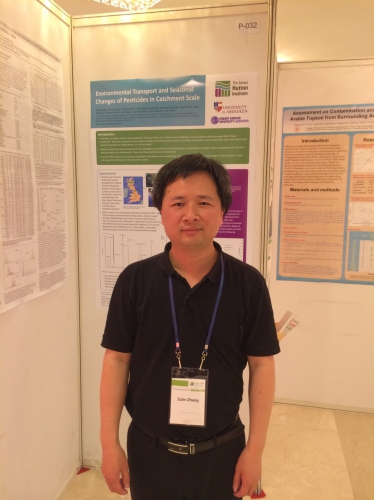
(Poster presented in ISEH 2014)
6-8 July (Hangzhou, Zhejiang)
It took me three days to visit Zhejiang Academy of Agricultural Sciences (ZAAS) in Hangzhou. During the visit, I gave an invited seminar to ZAAS research colleagues with the title of ‘Organic Contaminants Changes over Sewage Sludge Treated Soils’. We have a wide range of topics discussed in the seminar including on-going environmental pollution in China (e.g. contaminated land by pesticides or landfill, contaminated water and air in China), and what’s the experience in UK in term of pollution issue.
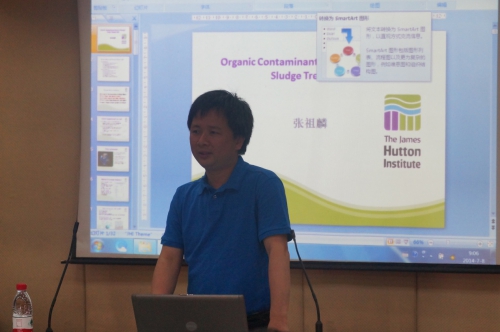
(Seminar presented in ZAAS)
Also I have discussed with the researchers from ZAAS on potential collaborations. We found some common interest, particularly on the environmental effect of organic wastes (e.g. animal manure, sewage sludge, compost etc.) application to agricultural soils. We are looking to propose some joint project to support ZAAS researchers to study and visit the UK (This joint-project proposal with Dr Hui LIN was actually submitted to ZAAS at the beginning September 2014, soon after my returning to UK. Project title ‘Study on the fate of antibiotics resistance genes during manure application in China and the UK’). Furthermore, we are planning to submit joint proposal to International Exchanges Scheme of Royal Society – NNSFC in the near future.
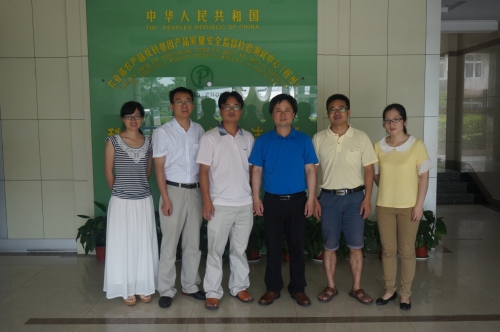
(Zulin Zhang with ZAAS colleagues)
16-18 July (Xiamen, Fujian)
In Xiamen University, I visited Prof Xinhong Wang. I gave a research seminar to the students and colleagues of the university, with title ‘Environmental Trend of Organic Contaminants in the Amended and Natural Soils’. We had discussions over the visiting period, including student and researcher visiting programme, joint PhD studentship and joint project opportunities etc. After the visit, I was very pleased to learn that my Overseas Scholars Joint Grant was approved by NNSFC. My collaborator on this project is with Prof Wang from Xiamen University. This two year project will further support our joint research over the environmental chemistry topic of ‘Investigate source and fate of oestrogens by compound specific stable isotope analysis’ (2015 – 2016).
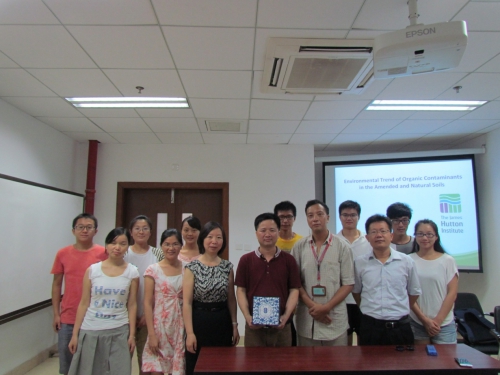
(Zulin Zhang with Xiamen University colleagues and students)
